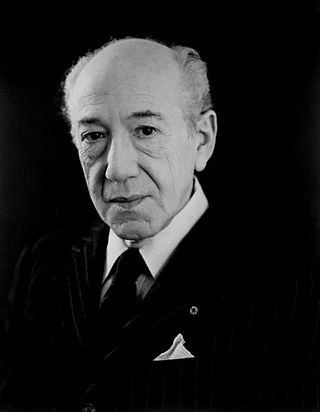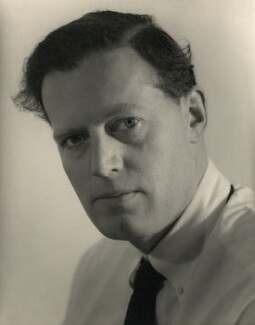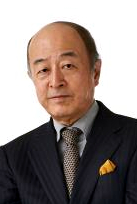Related Research Articles

Daniel Jenkyn Jones was a Welsh composer of classical music, who worked in Britain. He used both serial and tonal techniques. He is best known for his quartets and thirteen symphonies and for his song settings for Dylan Thomas's play, Under Milk Wood.

David Leo Diamond was an American composer of classical music. He is considered one of the preeminent American composers of his generation. Many of his works are tonal or modestly modal. His early compositions are typically triadic, often with widely spaced harmonies, giving them a distinctly American tone, but some of his works are consciously French in style. His later style became more chromatic.

Alun Hoddinott CBE was a Welsh composer of classical music, one of the first to receive international recognition.
Alan Rawsthorne was a British composer. He was born in Haslingden, Lancashire, and is buried in Thaxted churchyard in Essex.
Denis ApIvor was a British composer, best known for his ballet score Blood Wedding. He had a parallel career as a consultant anaesthetist.

Pēteris Vasks is a Latvian composer.
Gordon Percival Septimus Jacob CBE was an English composer and teacher. He was a professor at the Royal College of Music in London from 1924 until his retirement in 1966, and published four books and many articles about music. As a composer he was prolific: the list of his works totals more than 700, mostly compositions of his own, but a substantial minority of orchestrations and arrangements of other composers' works. Those whose music he orchestrated range from William Byrd to Edward Elgar to Noël Coward.
Alan Ridout was a British composer and teacher.
Boris Alexandrovich Tchaikovsky, PAU, was a Soviet and Russian composer, born in Moscow, whose oeuvre includes orchestral works, chamber music and film music. He is considered as part of the second generation of Russian composers, following in the steps of Pyotr Tchaikovsky and especially Mussorgsky.
Joseph Horovitz was an Austrian-born British composer and conductor best known for his 1970 pop cantata Captain Noah and his Floating Zoo, which achieved widespread popularity in schools. Horovitz also composed music for television, including the theme music for the Thames Television series Rumpole of the Bailey, and was a prolific composer of ballet, orchestral, brass band, wind band and chamber music. He considered his fifth string quartet (1969) to be his best work.

Richard Anthony Sayer Arnell was an English composer of classical music. Arnell composed in all the established genres for the concert stage, and his list of works includes six completed symphonies and six string quartets. At the Trinity College of Music, he "promoted a pioneering interest in film scores and electronic music" and jazz.

David Matthews is an English composer of mainly orchestral, chamber, vocal and piano works.
Arnold Atkinson Cooke was a British composer.
Carl Edward Vine, is an Australian composer of contemporary classical music.

Walter Kaufmann was a composer, conductor, ethnomusicologist, librettist and educator. Born in Karlsbad, Bohemia, he trained in Prague and Berlin before fleeing the Nazi persecution of Jews to work in Bombay until Indian Independence. He then moved to London and Canada before settling in the USA as a professor of musicology at Indiana University, Bloomington, Indiana in 1957. In 1964, he became a naturalized U.S. citizen.
Raymond Henry Charles Warren is a British composer and university teacher.
Iain Ellis Hamilton was a Scottish composer.
William Brocklesby Wordsworth was an English composer. His works, which number over 100, were tonal and romantic in style in the widest sense and include eight symphonies and six string quartets.

Shin'ichirō Ikebe is a Japanese composer of contemporary classical music.
Juraj Filas was a Slovak composer. His work included more than 100 compositions: symphonies, cantatas, numerous compositions for chamber ensemble, as well as the prize-winning TV opera Memento Mori; a concerto grosso Copernicus; the opera Jane Eyre (2010); The Wisdom of the Wise Man, a cantata for choir, cello and organ; The Song of Solomon, a cantata for soli, choir and orchestra; and the requiem Oratio Spei, which was dedicated to the victims of terrorism.
References
- 1 2 Graham Melville Mason. Obituary, The Independent, 1 March, 1993
- 1 2 3 4 David Gow. British Music Collection
- 1 2 Obituary, The Guardian, 27 February 1993
- ↑ Radio Times, Issue 3463, 28 April, 1990
- ↑ York Guildhall Orchestra
- ↑ Radio Times Issue 3463, 28th April 1990
- ↑ Sing We Merrily, The Chapel Choir of Glasgow University, Gemini GM2022 (1973)
- ↑ Radio Times Issue 2509, 11th December 1971
- ↑ Radio Times Issue 3476. 28th July 1990
- ↑ Obituary, The Times, 5 March 1993, p. 19
- ↑ Overture One-Two-Five (1978), British Film Institute
- ↑ The Hardy Review, Volume XVI-i, Spring 2014, pp. 29-45